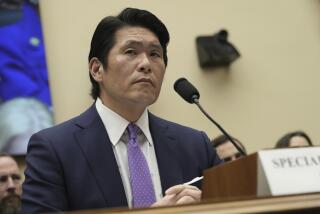Feinstein, CIA spar over alleged spying on Senate staff
- Share via
WASHINGTON -- Sen. Dianne Feinstein, the head of the Senate Intelligence Committee, and CIA Director John Brennan sparred Tuesday over the lawmaker’s allegation that agency officials secretly had searched Senate computers, an act she said had undermined congressional intelligence oversight and may have violated the law.
“I have grave concerns that the CIA search may well have violated the separation-of-powers principles,” Feinstein said on the Senate floor. “I am not taking it lightly.”
Feinstein’s public charge escalated a behind-the-scenes dispute with the CIA. The fight grew out of a long-running Senate investigation of the agency’s interrogation and detention practices during the George W. Bush administration.
The dispute now has opened a rift between the CIA and Feinstein, who has been one of the Senate’s strongest defenders of the intelligence agencies. It has also triggered a Justice Department review that potentially could lead to criminal charges.
Brennan, at a previously scheduled event a couple of hours after Feinstein made her statement, offered carefully worded remarks that did not dispute the actions Feinstein said had taken place, but did deny that they constituted “spying” on the Senate.
“Nothing could be further from the truth,” he said. “We wouldn’t do that. That’s just beyond the scope of reason.”
“Appropriate authorities right now ... are looking at what CIA officers as well as [Senate] staff members did,” Brennan said.
As part of the committee’s inquiry into the CIA’s interrogation program, which many see as having involved torture, agency officials set up a special facility in Virginia where committee staff members could review millions of secret documents.
At some point during their work, Senate staff members gained access to the draft of an internal review the CIA had done of the interrogations. Senators say that internal review, which remains classified, was far more critical of the CIA than the agency’s official responses to their questions had been.
CIA officials say the Senate aides were never supposed to have access to the draft review, which they claim is covered by executive privilege. They began to investigate how the committee staff members had gained access to it.
In January, the CIA informed the committee that it had conducted what the agency called an “audit” of the computers at the facility to determine how the staff members got the study.
In addition to the computers that the CIA itself had installed, Feinstein said, the search included a stand-alone computer drive that housed Senate committee work product and communications.
The CIA has referred the conduct of its own officers -- and also that of Senate aides -- to the Justice Department for possible criminal investigation, officials said.
Feinstein said the CIA investigative action may have violated the Constitution, various federal laws and a presidential executive order that prohibits the agency from conducting domestic surveillance.
She said she asked for an apology and an acknowledgment from the CIA that its search of the committee’s computers was inappropriate, but “I have received neither.”
In a statement last week, Brennan said the CIA acted appropriately.
Feinstein’s comments raise the stakes of the dispute that has surrounded the committee’s study of the CIA’s actions. The committee report on interrogation practices has not been made public, but people who have read it say it amounts to a blistering indictment of the CIA program.
They say the report concludes that little useful intelligence was gained from the tactics, and that it says CIA officials lied to their superiors and Congress about what was happening.
In a written response that is also still classified, the CIA disputes those conclusions, according to people who have seen the document.
Twitter: @kendilanianLAT
More to Read
Sign up for Essential California
The most important California stories and recommendations in your inbox every morning.
You may occasionally receive promotional content from the Los Angeles Times.











